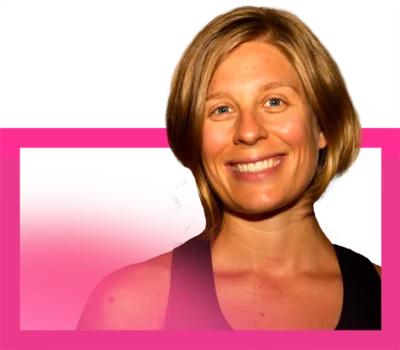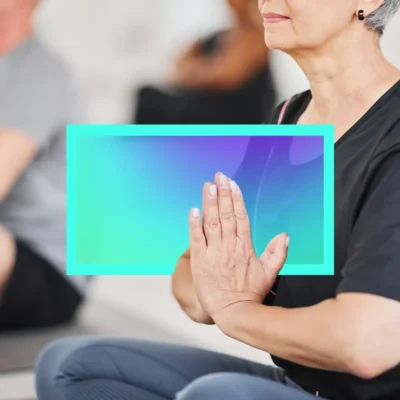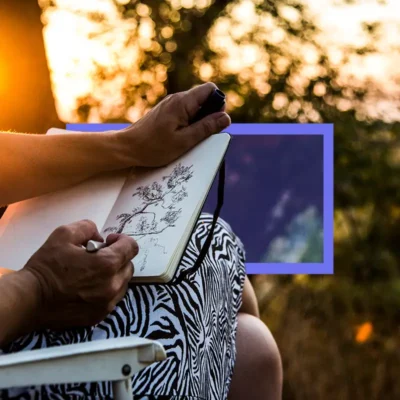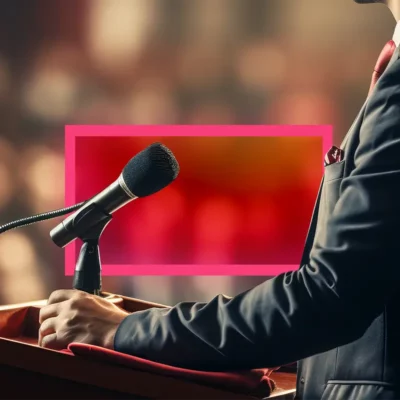Asking for what we need
Kathryn Nicolai, creator of the Nothing Much Happens podcast, learns at an early age to diminish her own needs. She never wants to become a problem for other people, so she pretends like she’s always okay. When she gets an opportunity to study abroad in Italy, a difficult experience with her host family causes her to retreat further into herself. It’s only when she feels the compassionate concern of someone who tells her it’s okay to have needs that she learns that it’s okay to take up space.
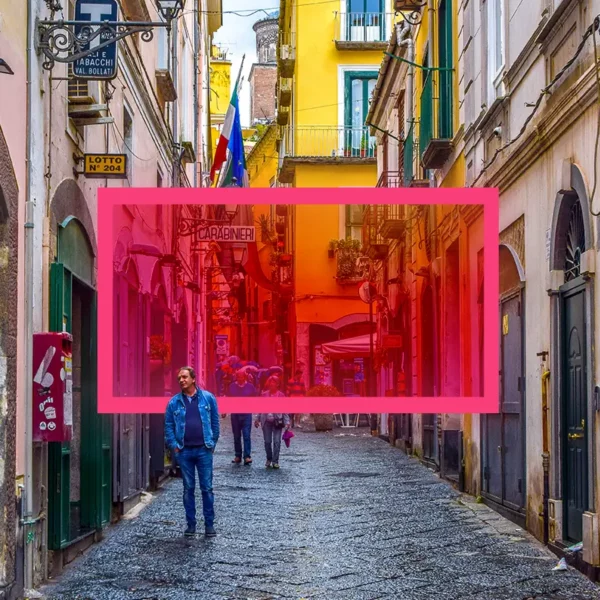
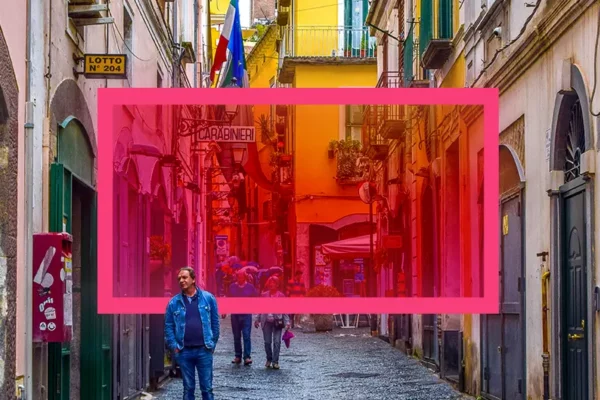
Table of Contents:
Transcript:
Asking for what we need
KATHRYN NICOLAI: I stand in front of a beautiful apartment building. There’s a pizzeria on the ground floor, and the scent of fresh dough and tomato sauce drift upward. I hear the bustle of downtown Salerno not too far away. I take a deep breath. The apartment door swings open. Standing in the door frame with a welcoming smile is a woman that’s shorter than me, with dark hair and green eyes. This is my fresh start.
ROHAN GUNATILLAKE: Kathryn Nicolai, creator of the Nothing Much Happens podcast, learned as a child that the way she should go through life, is to diminish her own needs. In her youth, she pretends like she’s always okay, because she never wants to become a problem for others. Today, she shares the story of how a transformative year in Italy teaches her that it’s okay to take up space, and to express our needs.
We also want to let you know that this story touches on subjects of neglect and child endangerment, so please take care while listening.
In this series, we combine immersive first-person stories, breathtaking music, and mindfulness prompts so that we may see our lives reflected back to us in other people’s stories. And that can lead to improvements in our own inner lives.
From WaitWhat, this is Meditative Story. I’m Rohan, and I’ll be your guide.
The body relaxed. The body breathing. Your senses open, your mind open, meeting the world.
NICOLAI: I hear the sound of people’s Sunday shoes as they clap against the travertine floors. The room smells like incense and dust. A large wooden crucifix hangs on the wall. St. Luke’s is a small church in Flint, Michigan. It’s not ornate like other churches I’ve seen, with their stained glass splashed with sunlight. It’s simple, modern, sterile. It’s where my family has been going my entire childhood.
Today, I’m standing at the front of the whole congregation. It’s the day of my confirmation. A Catholic rite of passage. I’m only 12, but everyone treats me like an adult. And I kind of like it.
The priest steps in front of me in his red vestments. An altar boy presents a small bowl and a pitcher of oil. I adjust my dress a little before I kneel on the ground. With his thumb, the priest makes a cross on my forehead. On cue, I say my line of the prayer. There’s a quiet hum of anticipation in the space.
I feel my parents’ and grandparents’ eyes watching me from the pews. They want this to go well.
The last time my family went through the confirmation process, it was for my brother. It was difficult. One night, I hear them arguing through my bedroom door. “This is silly!” my brother says. “I don’t believe in this!” My parents push back and he gets mad. He’s very vocal about not agreeing with the religion, not believing in God.
If I’m honest, I don’t believe either. I’ve never felt the connection to the church that’s expected of me. But I also don’t want to cause trouble. In my family, I’m the one who’s supposed to be simple, dependable, easy.
My family, like many others, has its struggles: mental health, addiction, money worries. There isn’t space for one more person with a problem. I can’t rock the boat, when our family’s boat seems dangerously close to tipping at any moment. So, I learn to swallow any issue that might bubble up for me, to be the happy-go-lucky kid. I play pretend all the time. I could be in the Olympics of playing pretend.
I even try to make myself smaller physically. I’m big for my age and I start dieting at 8-years-old. I do extreme workouts on weekends to change my body. I want to make myself more digestible. Easier to handle. To shave off the sticky bits and harsh edges. I try to diminish myself whenever I can.
When the confirmation ceremony is over, the priest returns to the altar. I stand and turn to face my family. My parents are beaming. I give a polite smile. A little wave to my grandma. I pretend. No matter what I’m actually feeling inside.
Today is my day, but it’s not about me. It’s not about what I’m feeling. It’s about doing something to make my parents and grandparents happy. To just make things easier.
I walk up the steps of the train station and out into the beautiful main square. The air smells sweet, like honeysuckle. I hear lively conversations all around me, but I can’t understand a word. In front of me, I see all the way down the hill — past buildings the color of clay, soft pink and orange, to the blue of the Mediterranean, sparkling in the distance. The white sails of small boats crowd the seaport.
I’m 16. In Salerno, a city in southern Italy. I’m here for a yearlong high school exchange program.
The culture shock is immediate. I see kids walking towards the train alone, riding down the street on vespas. None of that would have been allowed back in Flint. It’s the late nineties. Flint is one of the most violent cities in America. I’m not allowed to even walk down the block alone. When the General Motors plant shuts down in the eighties, almost everyone I know loses their job. And I grow up with this feeling that no one’s coming to help us.
I’m proud that I’m from Flint, but I feel a weight coming off my shoulders here in Salerno.
I’ve always been a romantic. I feel like Lucy, the protagonist in E.M. Forster’s A Room with a View. I love 19th century literature. When I discover the exchange program to Italy, it feels like my chance. I know it will be hard for my family not to have me home, especially my mom. I’m the easy one. The peacemaker. But I don’t want to look back and think, “I could have done that, but I didn’t.”
Standing in the square, I feel like I’m on an adventure, all on my own.
I shield my eyes from the sun to see a young family approach me — a man and a woman in their thirties with two small children. They ask me if I’m Kathryn Nicolai, and I say that I am. This is my host family. They’ve signed up through the exchange program to have me stay in their home for the next year.
I’m relieved to hear my host father speak English. He tells me he was born in America and moved to Italy as a teenager. I smile. He knows where I come from. It makes me feel like I can trust him.
Without a word, their six year old daughter slips her palm into my hand. We don’t speak the same language, but this little hand in mine feels comforting.
“Don’t call us mom and dad,” my host father says. “We’re too young for that.”
He says it so curtly. I’m caught a little off guard. I nod, hoping I don’t seem too nervous. I just so desperately want this to go okay. Even though I’m here on my own, on my adventure, I don’t want to be a problem.
I stand at the kitchen sink, hands covered in suds. A pot simmers on the stove, billowing steam into the air. I’m exhausted. The house is dim and cold. It looks out over a dusty alley. There are neighboring fields surrounded by chain link fences, and a dog’s kennel nearby.
It’s me and the two little girls at home. They’re in the other room, playing with their toys and watching the Simpsons on TV as they wait for lunch. The girls are supposed to eat pasta every day at two o’clock and have a second course. Soon after moving into my host family’s house, cooking this meal becomes my responsibility. I have no idea what I’m doing. Anything a teenager from Flint would feed Italian children would probably put Italian mothers in a coma. But it’s what my family expects. They treat me like an au pair.
My stomach grumbles. I’ve barely eaten today. I’m vegetarian, and my host family does little to accommodate that. I try to pretend it’s okay. I don’t want to make a fuss.
My host mom bursts into the kitchen and glares at me. “Don’t use too much hot water, it’s expensive,” she says in Italian. I try to tell her that’s why I’m heating it on the stove, rather than running the tap. But she cuts me off, saying, “You know, we don’t get any money to be your host family.”
My heart sinks. The family regularly reminds me that having me here is a financial strain, even though they signed up to take me in.
“I’m sorry,” I mumble. I don’t know what else to say. I want so badly to go back to the part where the family was nice to me. At first, they were more friendly, but in small, subtle ways, their real personalities come out.
When I go to school during the day, things are alright. I’ve made some friends. I like learning Italian. But in this house, I just try to make myself small.
The family tells me to shower less, so I don’t use the expensive hot water, and I comply. At first, it’s every third day. Then every fourth day. I don’t wash my clothing when I need to. I start to feel unclean and deeply uncomfortable. I slip into a depression.
One night, my host mother comes into my room. Her hair is disheveled and her eyes wild. She tells me to go downstairs and get in the car. Before I know it, we’re speeding down a dark road at night. She jerks the steering wheel erratically.
My body is tense. I feel nauseous. I don’t know where we’re going. I don’t know what’s wrong with her.
Finally, she swings the car hard to the side of the road and parks outside of my host father’s work. What are we doing here?
My host mother is crying and yelling. I need to fix this. Somehow.
I rush to the door of the office and try to get my host father to come out. But he’s dismissive. “Tell her to get over it,” he says coldly, and retreats back inside. My mouth drops open. Why does this feel like it’s my fault?
I look at my host mom. Her face is red and splotchy. Her eyes puffy. Something finally clicks for me. She is so clearly unwell. This family is unwell. The mother, always nasty and cruel. The father, severe and distant. The situation I’m in is a bad one. I haven’t been making this up. And I’m scared for my safety.
This year in Italy was supposed to be my adventure. A time to really explore myself. Prioritize me. But being with this family has put me back in an old pattern — diminishing myself, to the extreme.
I need to get out of here.
GUNATILLAKE: Kathryn is in a tricky spot here. One that no child should ever be put in. And in the face of all this awfulness, it’s powerful to hear Kathryn articulate what she needs. Let’s share in this moment with her by doing the opposite of diminishing ourselves. Letting the belly expand with the breath. Opening the chest. Taking up space.
NICOLAI: I stand in front of a beautiful apartment building. There’s a pizzeria on the ground floor, and the scent of fresh dough and tomato sauce drift upward. I hear the bustle of downtown Salerno not too far away. I take a deep breath. The apartment door swings open. Standing in the door frame with a welcoming smile is a woman that’s shorter than me, with dark hair and green eyes. My new host mom. Thanks to a friend from school intervening, my exchange program finally got me reassigned to a new host family. This is my fresh start.
I follow her into the clean, bright apartment. The walls are all white, and the floor is marble. Everything is immaculate. I can’t believe this is where I get to live for the last few months of the school year.
In my new host mom’s eyes, I see true kindness. This is the face of someone who really cares, and wants what’s best for me. I haven’t seen a face like that in months. I can even hear it in her laugh. It’s a wonderful laugh. It immediately makes me feel safe.
She reaches out her hand and says, “Give me your bag.” I nervously reply, “No, please.” None of my things have been washed. I don’t want her to see it all.
I tell her, “I’m sorry, I couldn’t wash my clothes.” She gives me a look and shakes her head. “That woman should have. You’re the child.” That woman is how she will always refer to my previous host mother.
I’m taken aback by how simple she makes it sound. She’s saying, it’s not my fault. It’s not my fault I couldn’t wash. Or fully take care of myself, when I was trying to take care of everyone else. When I was trying to make myself small.
I gingerly give her my bag. She opens it, and begins carefully going through my soiled clothes. She glances up at her husband and says to him in Italian, “I don’t know where this girl has been, but it was bad.”
It’s deeply affirming. I start to turn a corner.
I take a shower. A real, hot shower. I get dressed in fresh, clean clothes.
When I’m ready, my host mom comes into the room and she perches at the edge of the bed. She pats my hand gently. “We’re going to talk about things,” she says. “If you have a problem, you have to say it. And we’ll fix it.”
She’s giving me permission to express what I need. To take up space. She reassures me: if I come to her, I won’t be a burden.
And over the coming months, I really don’t feel like I am. Life in this home is so different. Afternoons on the balcony with my host family, weekends with friends in town. They even give me my own key to the apartment, this beautiful old key. I’ve never had my own key before.
The pain and discomfort of everything I went through is still so recent. But in this new house I start to feel that pain lessen.
I’m going to be okay here.
GUNATILLAKE: We all have needs. We all take up space. Let’s enjoy the relief that Kathryn is experiencing here with her, and let’s reflect on the people in our life who welcome us, who see us in this way, and make that space for us.
NICOLAI: “Come on, close!” I mutter to myself as I tug hard on the zipper of my suitcase. It refuses to budge. I’ve acquired more stuff in Italy than I brought here. Now my bag is bursting at the seams. I lean my full bodyweight onto it with one arm, and try to zip it shut with the other. It just won’t shut.
I sit back for a moment and wipe my damp forehead. It’s hard to believe that I’m really packing up my suitcase to leave Italy, that four months have passed already with my new host family. I look out through the window at the clear view of the ocean. It’s one of the things I’ll miss most about this room.
As I return my attention to my bag, I hear my host mom at the door. “What do you have in there?” she asks. “Can we take anything out?”
We unzip my bag, and she fishes out a box made of thin, white cardboard that I’d stuffed into the bottom. Inside is a ceramic nativity set. “What’s this?” asks my host mom. I hesitate, then I say, “That woman she gave it to me.” The mother of my old host family. My mind flashes to a miserable Christmas in that cold, dim house.
“I can’t just throw it away,” I say meekly. “It’s perfectly good.” She purses her lips. She can tell how uneasy it makes me to hold on to anything from that other house. “Well,” she says, “we can throw it away if we smash it with hammers.”
I almost laugh. Here’s this devout Italian Catholic suggesting that we destroy figurines of baby Jesus’ birth. But she’s already left the room. When she returns, she has a handful of newspapers in one hand and a hammer in the other. She lays out the ceramic figures between layers of newspaper and she gives me the hammer.
I look at her. Is she sure about this? “Kathryn,” she says. “You don’t have to remember and hold on to everything.”
So, I start smashing. I crush the nativity set in heavy blows — the shards cracking under my hammer. It’s a release of everything I went through in that house. All the times I pretended like it was okay. All the times I diminished myself for the sake of someone else’s comfort. None of what happened there was my fault. And there’s no excuse for that kind of abuse. And there was nothing I could have done differently to fix it. But I don’t have to pretend it’s okay either. I don’t have to carry that forever. I can smash it up and leave it behind.
When I’m finished, my host mom helps me sweep everything up.
She gives my arm a squeeze. She makes me feel so seen. She reminds me that if I need to do something for myself, that’s okay. Even if that means smashing something up with a hammer. I can be sad. Or uncomfortable. Or angry. Those feelings are valid. And sometimes I need to feel them. That does not make me a burden.
These months with my new family have given me space to really explore me. To think about what I want. What I need. Who I want to be. It’s something I’ve never really given myself the chance to think about before.
As I throw the last remaining shards in the trash, I feel completely joyful almost giddy.
It’s late fall in Michigan. I sit in a desk that’s a little too small for me. The room is bright with fluorescent light. There are crayon drawings covering the walls. This is an elementary school classroom during the day. Eight other students sit around me. We’re all here tonight for the same reason — to graduate high school fast.
After everything I went through, I can’t imagine going back to my regular high school. I need something different for myself. So that’s what I ask for. I go to night school and do an independent study, so I can graduate early and go to college. It’s not a choice my mom or dad fully understand, but it’s what I need, and now I know how to ask for it.
I’ve learned how to choose myself.
It’s a lesson I’ll have to keep learning as I grow older. Life is a spiral staircase and I pass the same point again and again, but on a different level each time. This is just my first time around. But I’m no longer a shrinking violet. I’ve bloomed.
Sometimes it feels easier to diminish your own needs. To put others first, not make a fuss, and pretend that everything’s ok when it definitely isn’t. But when we choose ourselves, when we really ask ourselves what we need and prioritize it, we find it’s more than okay to take up space. We can allow ourselves to feel what we feel and take charge of our lives. That’s when the real adventure begins.
Rohan’s closing meditation
GUNATILLAKE: Thank you Kathryn.
I’m grateful to Kathryn for shining a light on needs and how things can really turn around when we stop playing them down and instead communicate what we need in such a way that others can meet them, even if in a low key way.
Kathryn’s story contains a number of notes I’d love us to hit in our closing meditation together. So let’s get into it.
Let’s start with the idea of space. I love what Kathryn says about it being okay that we take up space. Let’s enjoy it. We are a spatial being. Like the moon, like alpha Centauri, like Everest, our weird, beautiful, wild body is a body in space. Let it take that space. Let us feel that space.
Dropping our awareness now into the sense of our body as a whole. Apologizing for nothing. This is us. The touch of the air on our skin. The sensations of our breath. That tension in our shoulders. The sense of softness as we smile together. It’s our space. Nothing other than us in that space.
Now that we’re in our space, let’s turn to our needs.
Take a few seconds — there’s no rush at all — to scan your body, from the top of your head to the base of your body, and back again. And as you do, notice the area or areas of the body that are asking for some relaxation.
Noticing areas of tension and where we can, softening and relaxing those areas.
My needs are in my hands and my jaw and my eyes, actually. Where are yours? Where does your body need to soften?
Let’s do it again. Scanning the body for areas of tightness or holding. And this time, refining the awareness a touch more, magnifying it if you like.
Sensing into any areas of subtle holding, subtle tension.
This is a quieter need, but a need nonetheless.
So again, we heed that need and soften around it.
I don’t know what your week ahead is looking like.
Both the joy and the strangeness of hosting this show and creating these shared community meditations for you all, is that I don’t know what’s happening for you, and so how to pitch it just right for what you need.
But you do.
So take some time to reflect on the quality you think you most need in the week ahead.
Name it.
Name the quality.
And as we close out, let’s make the intention to express that quality as much as we can.
Hey, why not express it now, whatever it is.
Meeting your need with your action.
Thank you Kathryn, again, for what must have been a challenging story to tell.
And thank you for being part of this community.
Go well and see you next time.
We’d love to hear your personal reflections from Kathryn’s episode. How did you relate to her story? You can find us on all your social media platforms through our handle @MeditativeStory. Or you can email us at: [email protected].

